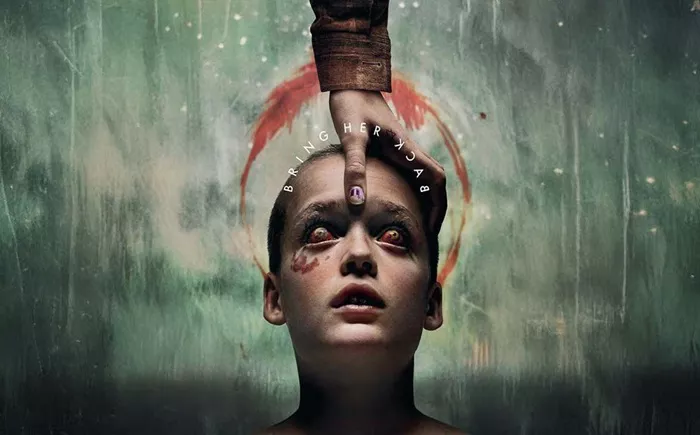Grief is the all-consuming force at the heart of directors Danny and Michael Philippou’s follow-up film, Bring Her Back. This movie channels the kind of primal agony that acts like a black hole—sucking in everything around it, extinguishing light, and leaving only despair in its wake. Following the brutal visceral style of their debut Talk to Me, the Philippous deliver a horror film stripped of vibrancy or hope, immersing the audience instead in unrelenting dread and anguish from start to finish.
The only moment of tenderness appears in the opening scene, where protective older brother Andy (Billy Barratt) collects his visually impaired sister Piper (Sora Wong) from a bus stop after her failed attempt at making friends. This brief respite shatters when they return home to discover their father dead in the shower—a traumatic event barely registered before social services intervene, forcing the siblings apart.
They are taken in by Laura (Sally Hawkins), an eccentric woman caring for a mysterious child named Oliver (Jonah Wren Phillips), who is mute and unsettlingly possessed. Laura, herself no stranger to profound loss, harbors dark intentions for Andy and Piper. Though occult elements, such as creepy tapes, hint at supernatural undertones, the film’s true horror lies more in Laura’s manipulative and abusive control, rather than overt scares. Jonah Wren Phillips’ portrayal of Oliver embodies body horror’s grotesque potential, yet most of the tension springs from Laura’s calculated cruelty—her gaslighting and emotional abuse driving a wedge between the siblings in a heartbreaking display of trauma inflicted on minors.
Sally Hawkins dominates the film as Laura, crafting a character both infuriating and compelling. She deftly balances charm with chilling malevolence, exposing a woman warped by grief into a destructive force. Hawkins’ ability to elicit sympathy for Laura’s own suffering, even amid her monstrous acts, speaks to her skill—though the script reveals too little of Laura’s humanity until it’s almost too late. Billy Barratt equally shines as Andy, embodying a teenager desperately trying to hold himself together in the face of unimaginable loss.
Bring Her Back sacrifices traditional horror thrills for an oppressive atmosphere thick with human cruelty and emotional torment. While occult references support the narrative, the film’s real terror stems from human darkness and pain, making it a psychologically heavy experience. Attempts to expand the story, such as a subplot where Andy opens up to Laura, feel clumsy and manipulative, detracting from the film’s otherwise tight focus on despair.
This film is a significant but tonally flat addition to the film industry, lacking the nuance and hope that balanced the Philippous’ debut. It forces viewers to confront trauma unrelentingly, culminating in a bleak ending that denies any catharsis.
Bold and boundary-pushing, Bring Her Back redefines what horror can achieve—particularly within the psychological thriller genre—by delivering a raw and harrowing look at grief’s darkest recesses. This is a movie that will leave you unsettled long after the credits roll, securing its place as one of the most soul-crushing horror films of the year.
Bring Her Back hits theaters on May 30, 2025.

